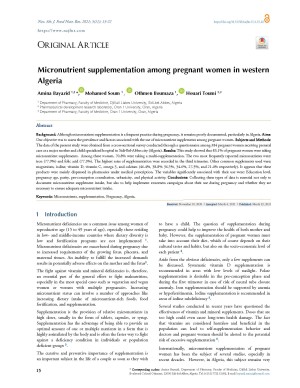Micronutrient supplementation among pregnant women in western Algeria
Abstract
Background: Although micronutrient supplementation is a frequent practice during pregnancy, it remains poorly documented, particularly in Algeria. Aims: Our objective was to assess the prevalence and factors associated with the use of micronutrient supplements among pregnant women. Subjects and Methods: The data of the present study were obtained from a cross-sectional survey conducted through a questionnaire among 384 pregnant women receiving prenatal care at a major mother and child specialized hospital in Sidi-Bel-Abbes city (Algeria). Results: This study showed that 83.1% of pregnant women were taking micronutrient supplements. Among these women, 70,8% were taking a multi-supplementation. The two most frequently reported micronutrients were: iron (77.9%) and folic acid (77.3%). The highest rates of supplementation were recorded in the third trimester. Other common supplements used were: magnesium, iodine, vitamin D, vitamin C, omega 3, and calcium (46.4%, 38.8% 36.5%, 34.6%, 27.3%, and 21.4% respectively). It appears that these products were mainly dispensed in pharmacies under medical prescription. The variables significantly associated with their use were: Education level, pregnancy age, parity, pre-conception consultation, urbanicity, and physical activity. Conclusions: Collecting these types of data is essential not only to document micronutrient supplement intake, but also to help implement awareness campaigns about their use during pregnancy and whether they are necessary to ensure adequate micronutrient intake.
Full text article
Authors
Copyright (c) 2021 Authors

This work is licensed under a Creative Commons Attribution 4.0 International License.
-
Attribution — You must give appropriate credit, provide a link to the license, and indicate if changes were made. You may do so in any reasonable manner, but not in any way that suggests the licensor endorses you or your use.
-
No additional restrictions — You may not apply legal terms or technological measures that legally restrict others from doing anything the license permits.





